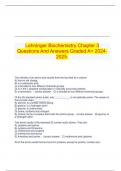Exam (elaborations)
Lehninger Biochemistry Chapter 3 Questions And Answers Graded A+ .
- Course
- Institution
Lehninger Biochemistry Chapter 3 Questions And Answers Graded A+ . The chirality of an amino acid results from the fact that its α carbon: A) has no net charge. B) is a carboxylic acid. C) is bonded to four different chemical groups. D) is in the L absolute configuration in na...
[Show more]



